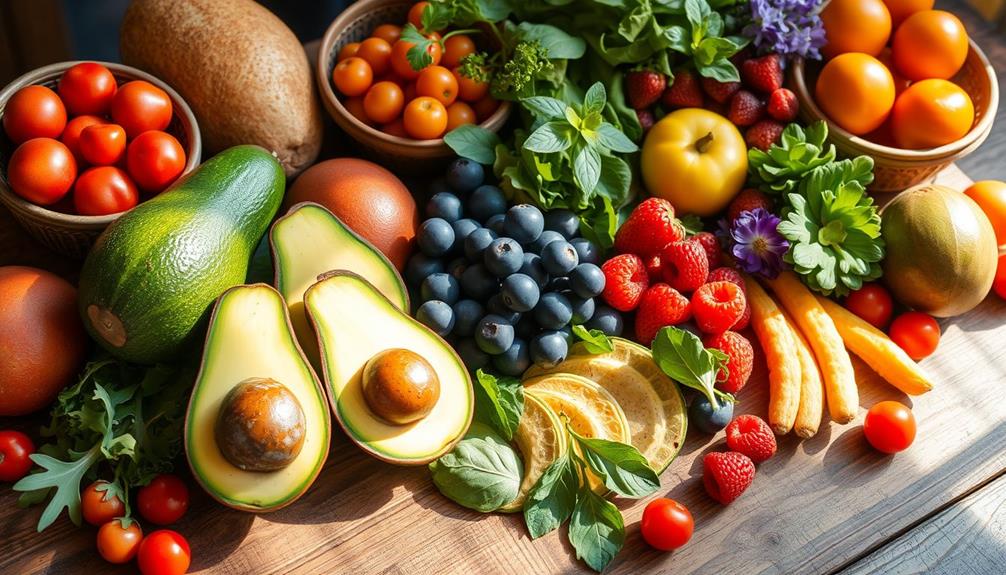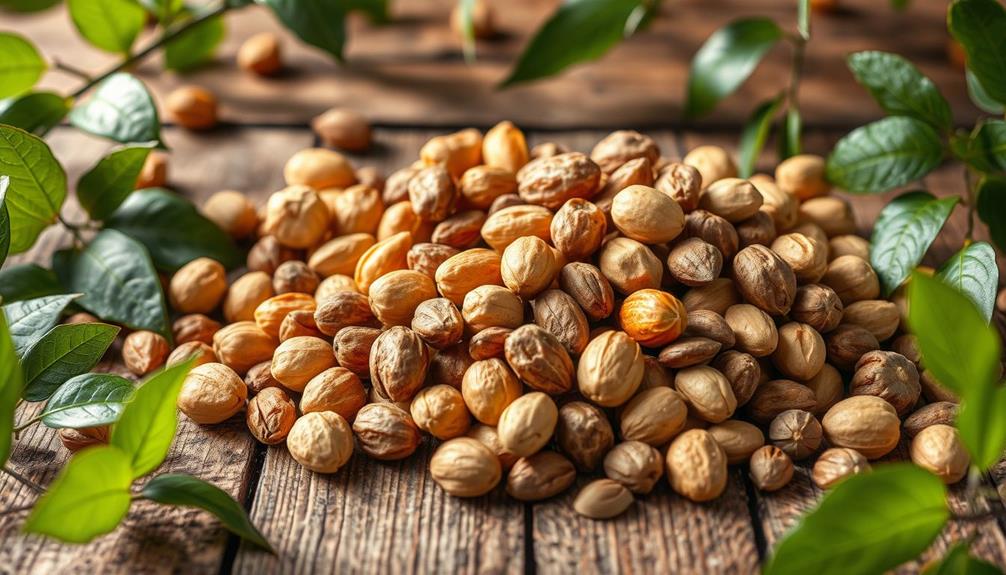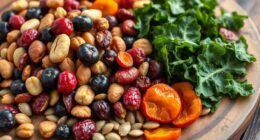Eating raw food can help you look younger by lowering the intake of harmful compounds known as advanced glycation end products (AGEs), which contribute to wrinkles and skin sagging. Raw fruits and vegetables are packed with antioxidants and essential vitamins that support skin repair and hydration. This diet promotes better digestion and detoxification, which can further enhance your skin's appearance. By incorporating more raw foods into your meals, you can improve overall skin health and reduce inflammation. Curious about which specific raw foods can maximize these benefits? You might find some surprising additions to your diet.
Key Takeaways
- Raw foods are lower in advanced glycation end products (AGEs), which are linked to increased wrinkles and skin sagging.
- High antioxidant content in raw foods supports skin elasticity and combats oxidative stress, promoting a youthful appearance.
- Nutrient-rich raw foods provide essential vitamins A, C, and E that aid in skin repair and rejuvenation.
- Hydrating fruits and vegetables in a raw diet enhance skin moisture levels, reducing inflammation and promoting a radiant complexion.
- A balanced raw vegan diet improves digestion, detoxification, and overall health, contributing to a more youthful look.
Impact of Raw Foods on Aging
The impact of raw foods on aging is significant and can be transformative for your skin and overall health. By adopting a raw vegan diet, you're reducing your intake of advanced glycation end products (AGEs), which are typically found in cooked foods. High AGE consumption can lead to increased wrinkles and skin sagging, so opting for raw foods helps protect your skin from premature aging.
Additionally, raw foods are rich in antioxidants, which can support your overall health and may help combat oxidative stress in various ways, including daily cranberry juice consumption that offers additional antioxidant benefits.
Raw foods are packed with antioxidants and essential vitamins A, C, and E, which play a vital role in skin repair and rejuvenation. These nutrients help combat oxidative stress, keeping your skin looking youthful.
Plus, incorporating high-water-content fruits and vegetables into your diet promotes hydration, reduces inflammation, and leads to fewer breakouts. This results in a clearer and more youthful complexion.
Moreover, the fiber and phytonutrients in raw foods support digestion and detoxification, enhancing your skin's health and vibrancy. You may also notice increased energy levels and improved mental clarity, both of which positively influence your overall well-being and perception of youthfulness.
Shifting to a raw vegan diet can truly rejuvenate your body and spirit, making you feel and look younger.
Nutritional Benefits of Raw Diet
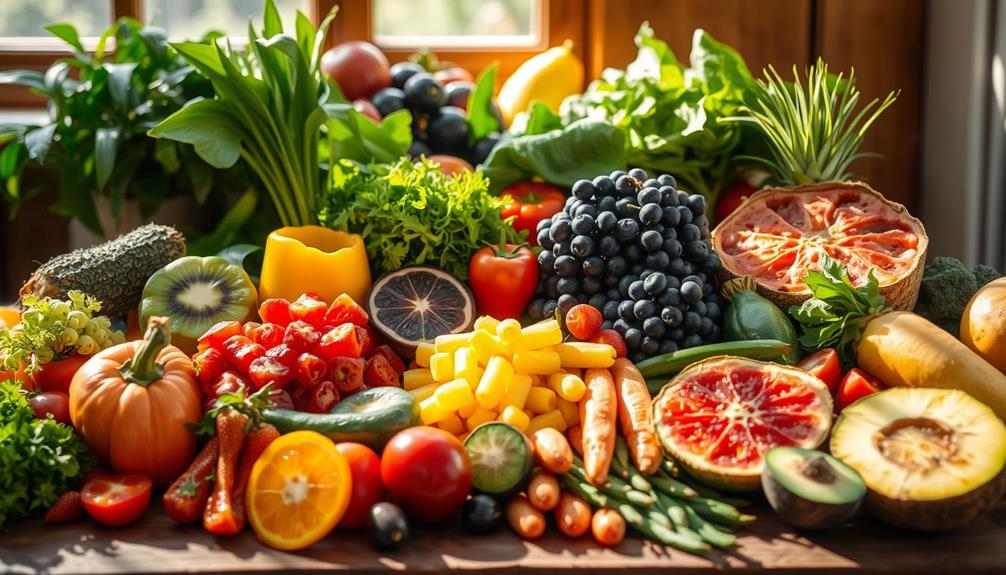
Frequently, people overlook the incredible nutritional benefits of a raw food diet, which can profoundly affect your health and appearance. By embracing a plant-based diet rich in raw foods, you're tapping into powerful antioxidant properties found in fruits like blueberries and leafy greens. These antioxidants combat oxidative stress, promoting skin elasticity and giving you a youthful glow.
Additionally, essential oils like peppermint oil may complement a healthy lifestyle by enhancing circulation and promoting overall wellness.
Raw foods are packed with essential vitamins A, C, and E, essential for skin repair and rejuvenation. These vitamins help reduce the visibility of wrinkles and age spots, enhancing your overall skin health. The high water content in raw fruits and vegetables boosts hydration, decreasing inflammation and leading to clearer, healthier skin.
Additionally, the fiber in raw foods aids digestion and promotes detoxification, which not only benefits your gut but also enhances your skin's liveliness. Incorporating healthy fats from nuts and seeds further supports skin barrier function, resulting in a more radiant complexion.
Raw Vs. Cooked Foods Comparison
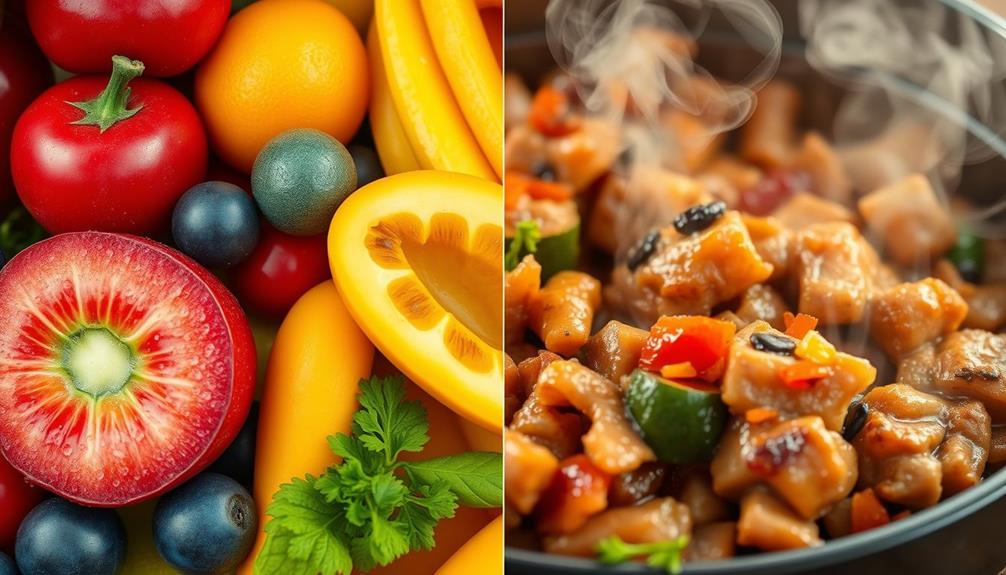
When you compare raw and cooked foods, you'll notice significant differences in their AGE content and nutritional benefits.
Raw foods tend to have fewer AGEs, which can help lower inflammation and promote healthier skin.
Additionally, embracing a balanced diet with a focus on fresh ingredients can enhance your overall wellness and energy, leading to a more youthful appearance.
Understanding these differences can empower you to make better dietary choices for a more youthful appearance, as it aligns with the principles of emotional resilience and creativity.
AGE Content Differences
Raw foods generally boast lower levels of advanced glycation end products (AGEs) compared to cooked options, making them a smart choice for those aiming to maintain youthful skin and overall health.
For example, raw steak tartare contains only 707 AGEs, while fried beef steak packs a whopping 10,058 AGEs. This considerable difference highlights how cooking methods can heavily influence AGE levels in your food.
Additionally, incorporating more fruits and vegetables into your diet can further support skin health, as they're rich in antioxidants and nutrients that combat oxidative stress foods beneficial for managing gout symptoms.
High-heat cooking techniques like frying and roasting drastically increase AGE content, which can accelerate skin aging and contribute to various health issues.
On the other hand, foods like raw chestnuts have just 2,723 AGEs, while roasted ones jump to 9,807 AGEs.
If you want to enjoy cooked foods without the high AGE levels, consider healthier cooking methods like microwaving or steaming.
These techniques can considerably reduce AGE content while preserving the nutritional value of your meals.
Nutritional Benefits Comparison
The nutritional benefits of raw foods greatly outweigh those of cooked options, especially when it comes to maintaining youthful skin and overall health.
Raw foods typically have fewer advanced glycation end products (AGEs), which are harmful compounds that can accelerate skin aging. For instance, raw steak tartare contains only 707 AGEs, while cooked fried beef steak skyrockets to 10,058 AGEs.
Furthermore, herbal teas like chamomile and ginger can complement a raw food diet by offering anti-inflammatory properties that may help with skin health and overall relaxation, making them a perfect addition to your wellness routine herbal teas that relieve menstrual discomfort.
Raw foods are richer in essential vitamins A, C, and E, all vital for skin repair and rejuvenation. These vitamins help combat oxidative stress and inflammation, both linked to skin aging.
Additionally, raw foods boast higher antioxidant levels and water content, which further support skin health. The fiber in raw foods also promotes better digestion and detoxification, leading to clearer skin.
In contrast, cooking methods, especially high-heat techniques like frying, greatly increase AGE levels and diminish the nutritional benefits of the food. For example, roasted chestnuts contain 9,807 AGEs compared to just 2,723 in their raw form.
Cooking Techniques to Reduce AGEs
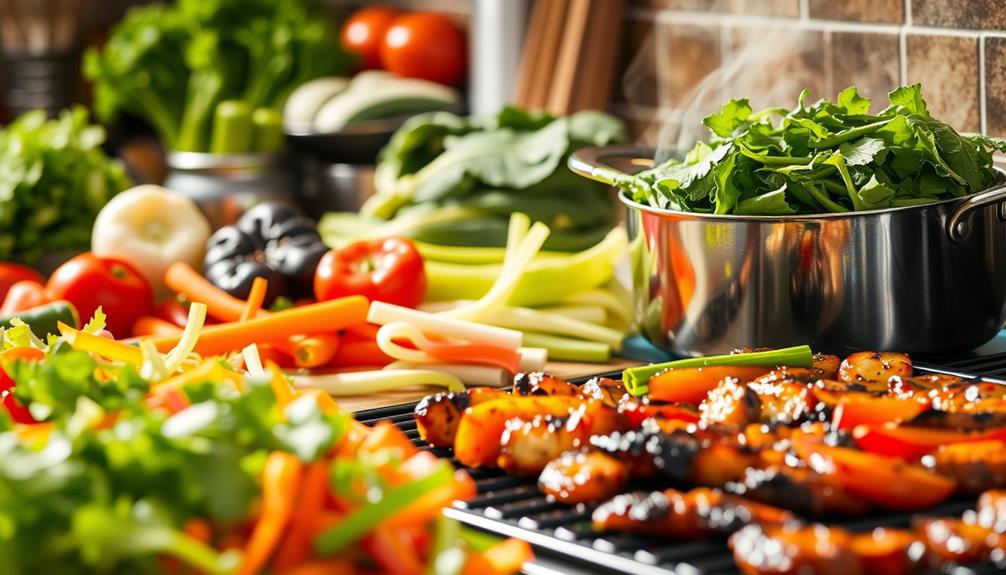
When it comes to cooking, using low-heat methods can keep advanced glycation end products (AGEs) in check.
Techniques like steaming or poaching not only preserve nutrients but also promote healthier meals, similar to various brewing methods that affect caffeine content considerably.
Plus, marinating your meats in vinegar or lemon juice adds flavor while further reducing AGEs.
Low Heat Cooking Methods
Embracing low heat cooking methods can make a significant difference in reducing advanced glycation end products (AGEs) in your meals. Techniques like steaming, poaching, and microwaving not only lower AGE formation but also help maintain the nutritional integrity of your food. This is essential for supporting skin health and your overall well-being.
Here's a quick comparison of various cooking methods and their AGE levels:
| Cooking Method | AGE Formation Level | Nutritional Retention |
|---|---|---|
| Steaming | Low | High |
| Poaching | Low | High |
| Microwaving | Moderate | Moderate |
| Frying | High | Low |
| Roasting | High | Moderate |
Marinating for AGE Reduction
Incorporating marinating into your cooking routine can further enhance your meals while reducing the formation of advanced glycation end products (AGEs). When you marinate meats in acidic solutions like vinegar or lemon juice, you considerably lower AGE formation during cooking. This not only makes your meals healthier but also less aging-promoting.
Additionally, understanding the importance of budgeting for health can encourage you to invest in quality ingredients that support your overall well-being. Some marinades can reduce AGEs by up to 40%, allowing you to enjoy flavorful, nutritious dishes.
To maximize the benefits, consider marinating before using high-heat cooking methods. This technique effectively decreases AGE content, so you don't have to sacrifice taste for health.
Additionally, if you microwave food after marinating, you'll notice even lower AGE levels compared to traditional cooking methods.
Implementing a Raw Food Diet
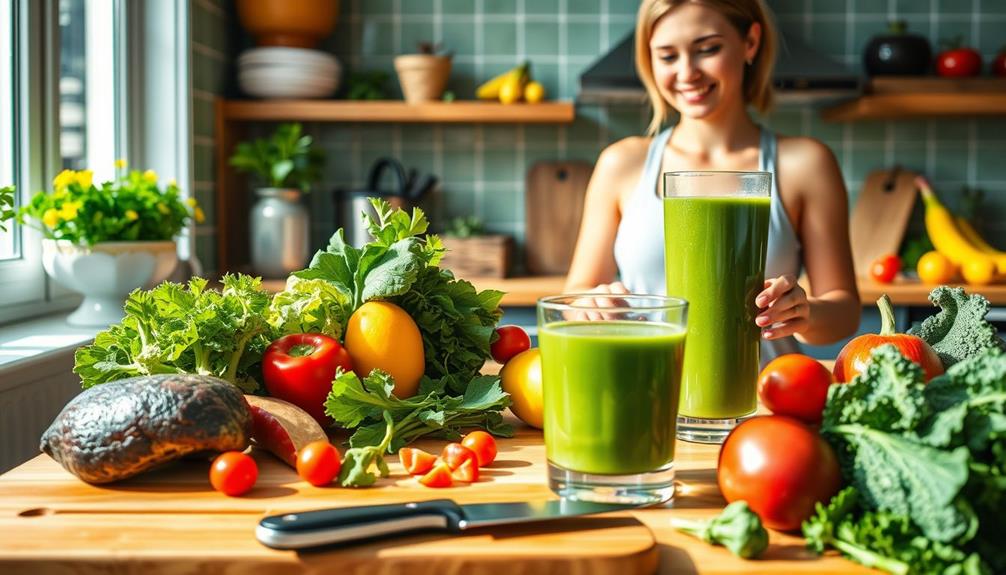
Shifting to a raw food diet can be an exciting journey towards better health and liveliness. To start, gradually incorporate a variety of fruits, vegetables, nuts, and seeds into your meals. This gradual change helps your body adjust to your new eating habits without overwhelming it.
Meal planning is crucial; it keeps you consistent and guarantees you're getting a balanced intake of nutrients while steering clear of processed foods. Additionally, consider incorporating important oils for enhancing your wellness, as essential oils for skin conditions can complement your raw food lifestyle.
Utilizing smoothies and salads is a fantastic way to enjoy eating raw foods. They make it easy to consume a wide array of raw ingredients, maximizing nutrient density and hydration from fruits and vegetables.
While you'll reap many health benefits from a raw food diet, careful planning is necessary to meet your nutritional needs, especially regarding protein and important fatty acids.
Be aware that you might experience initial detox symptoms, like fatigue or cravings, as your body adapts. Listen to your body during this change and adjust your intake accordingly.
With the right approach, you'll not only enhance your energy but also embrace a lifestyle that supports your quest for youthful living.
Raw Vegan Lifestyle Insights

A raw vegan lifestyle offers a unique approach to health that emphasizes the consumption of unprocessed fruits, vegetables, nuts, and seeds. By eliminating animal products, you focus on nutrient-dense foods that are rich in antioxidants and essential vitamins. This shift can promote skin elasticity and combat oxidative stress, essential for maintaining a youthful appearance.
Incorporating ingredients like glycolic acid in scalp care can further enhance your overall skin and hair health by promoting exfoliation and improving absorption of nutrients.
Many who adopt this lifestyle report increased energy levels and improved digestion, thanks to the high fiber content in their diets. With a macronutrient distribution of 20-25% fats, 65% carbohydrates, and 10-15% protein, your skin health benefits from the focus on hydration and nutrient density rather than just protein intake.
Incorporating hydrating fruits like avocados and berries can lead to clearer skin and a brighter complexion. Additionally, raw vegans often experience enhanced mental clarity and a sense of spiritual well-being.
They believe their dietary choices contribute to a youthful look while reducing the risk of chronic diseases. By embracing a raw vegan lifestyle, you can enjoy a vibrant, health-focused approach that aligns with your goals for longevity and energy.
Anti-Aging Foods and Their Effects
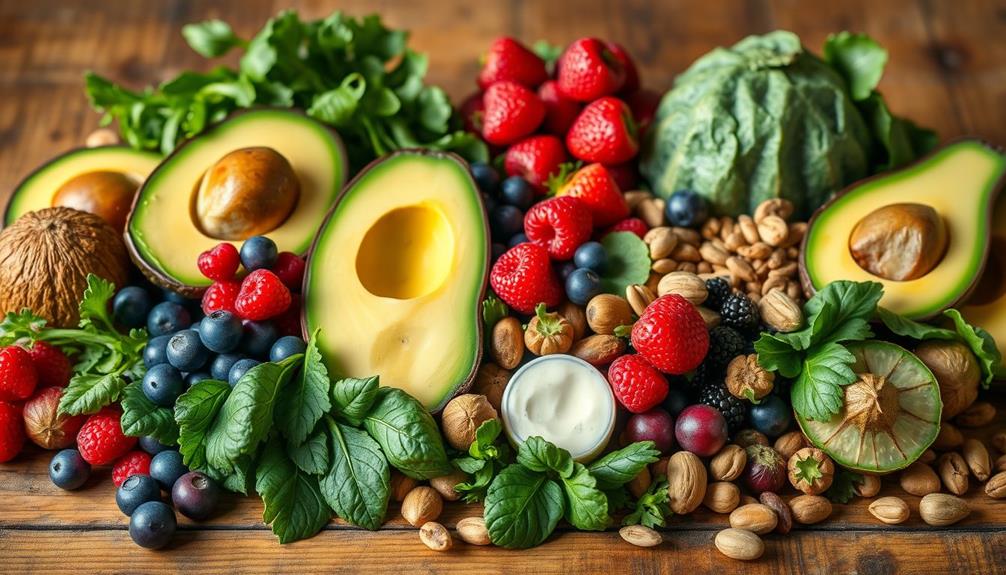
Many anti-aging foods can greatly impact your skin's health and appearance. Foods rich in antioxidants, like blueberries and leafy greens, boost skin elasticity and combat oxidative stress, helping to reduce visible signs of aging.
Additionally, maintaining a balanced diet rich in lifestyle for longevity can enhance your overall skin health. You'll also benefit from the high water content in raw fruits and vegetables, which keeps you hydrated and can lead to fewer wrinkles and breakouts.
By consuming a diet low in advanced glycation end products (AGEs), often found in cooked foods, you can protect your skin from premature aging effects like wrinkles and sagging. Nutrient-rich raw foods are packed with essential fatty acids and vitamins A, C, and E, which play crucial roles in skin repair and rejuvenation, promoting a youthful glow.
Incorporating superfoods into your raw diet, such as chia seeds, spirulina, and avocados, can further enhance your overall nutrition and support anti-aging benefits.
These foods contribute to a brighter complexion and clearer skin, making it easier for you to achieve that youthful appearance you desire. Embrace these anti-aging foods for a healthier, more radiant you!
Mental and Community Well-Being

Embracing a raw vegan lifestyle can greatly enhance your mental and community well-being. By consuming nutrient-dense foods rich in antioxidants and healthy fats from nuts and seeds, you'll likely experience improved mental clarity and focus. This shift in diet can positively impact your overall mental well-being, helping you feel more alert and engaged.
Community support is essential on this journey. Joining groups like Raw Vegan Heroes not only provides accountability but also offers a space to share experiences that foster growth and motivation. Engaging with like-minded individuals creates a sense of belonging, which further enhances your mental state.
Spiritual practices and a positive mindset are also integral. They help you manage stress effectively, contributing to a greater sense of peace within the community. Mentorship from those who've successfully adopted this lifestyle can offer invaluable guidance, reinforcing the importance of connecting with individuals who embody the health outcomes you aspire to achieve.
Ultimately, the interconnectedness of life experiences within the raw vegan community serves as a pathway to personal growth. By embracing these shared ideals, you promote a collective approach to mental and community well-being.
Frequently Asked Questions
Does Eating Raw Food Make You Look Younger?
Eating raw food can enhance your skin's appearance by providing essential nutrients, increasing hydration, and reducing inflammation. You'll likely notice improved clarity and liveliness, contributing to a more youthful look and overall well-being.
What Food Makes Your Face Look Younger?
You might think only skincare products can rejuvenate your face, but incorporating antioxidant-rich foods like berries and avocados into your diet can greatly enhance your skin's appearance, keeping it youthful and radiant with every bite.
Does Cutting Out Meat Make You Look Younger?
Cutting out meat can help you look younger. By reducing advanced glycation end products and boosting antioxidant intake, you'll enhance skin repair, improve elasticity, and enjoy a clearer complexion, making your skin appear more vibrant and youthful.
What Food Is Good for Anti-Aging?
Think of your skin as a garden; nourishing it with antioxidant-rich fruits, hydrating veggies, and healthy fats helps it flourish. Incorporating these foods into your diet can rejuvenate your skin and combat aging effectively.
Conclusion
As you savor vibrant salads and crunch on fresh veggies, picture your skin glowing like the morning sun. Embracing a raw food diet can nourish not just your body but also your spirit, offering a fresh outlook on life. While you might not turn back the clock entirely, the benefits of raw foods can certainly help you feel revitalized and youthful. So, grab that colorful plate and relish every bite; your journey to a younger you starts now!

